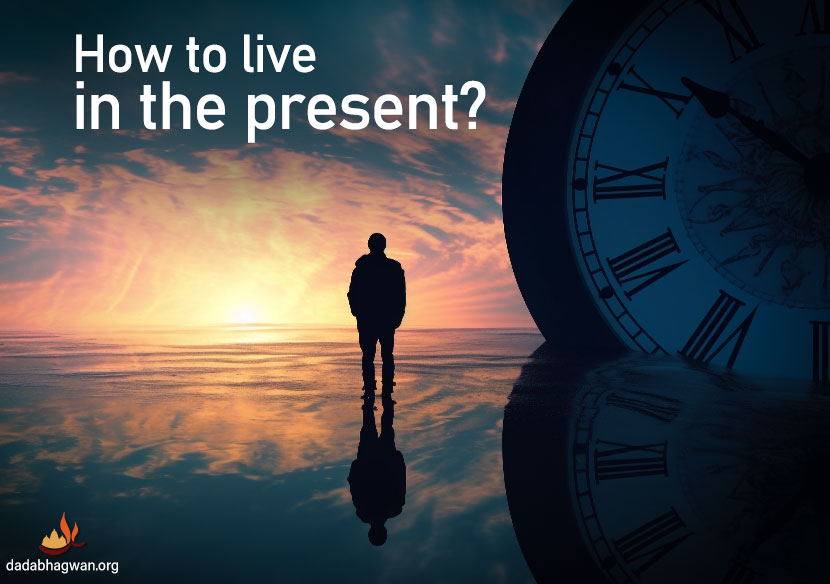How to live in the present?
Always remains in the present
What am I saying? Learn to remain in the present.
I have given you all the protections (5 Agnas) to remain in the present. And ‘we’ remain in the present without the need for any protection.
Questioner: How can one remain in present?
Dadashri: If you forget past then you can remain in present. Past is gone, so what can happen if you remember it today? You can lose the profit of present. And that loss is there for sure.
We have entrusted the future to the control of vyavasthit—scientific circumstantial evidence; and the past is gone. So now do we not have to settle the files of the past which arise in the mind, at this very instant? Then you should say, ‘no, come tonight at ten or eleven o’clock. I have kept one hour, come at that time, we will settle then, not now.’ Even if the news of loss of money comes at this time, You should not miss out the present. So where should you stay?
Questioner: In the present.
Dadashri: Yes, if I remember that this person had told me such thing a few minutes ago, then I would lose the present. Whatever happened, settle that thing right there only.
If you go to the railway station and you have to get in the train, you are in hurry, you have to handle an important case of the day, you cannot get into the train and you miss your major appointment. That is now past and ‘what will happen in the court?’, is the future which is in the control of vyavasthit. Therefore, remain in the present. For us such analysis would happen immediately. All the Gnan will present instantly, and for You it may take some time.
Questioner: We had a talk with You that ‘vyavasthit should remain present at a time.’
Dadashri: All the Gnan, the five sentences (Agnas) must be present at the time. That which presents and is there instantly is Gnan indeed.
Questioner: So then what is our mistake that ‘at a time the Gnan—5 Agnas—does not present and prevail?’ We do remember later on. Then it gets settled with equanimity. So we want to know more regarding this matter.
Dadashri: The main and important thing about vyavasthit—scientific circumstantial evidence—is that a vyavasthit (upset the orderly discharge through interference of ‘I am *Chandulal’) is gone now and this vyavasthit is what is. Everything is vyavasthit in our life now. Vyavasthit means, one does not have to worry about the future, one forgets the past and thus remains constantly in the present. That is vyavasthit.
When I am eating a mango or taking a meal at that time, I would not remember satsang. If you arrive outside in the home, and if someone has given us that gnan—information that *Chandubhai has come, so at that time of eating the meal that memory of your being there arises, so then ‘we’ tell it— the mind, ‘come after some time. Right now let me finish eating.’ The information, ‘*Chandulal has come’, has become the past. So we would remain in present. This dinner is in front now and so, ‘eat this alphonso mango at ease! Eat some but chew it well.’
Questioner: With applied awareness of the Self in all activities of the non-Self.
Dadashri: Nothing else at all; in the present only. We remain in the present. That is why people say, ‘Dada, you are tension free.’
I said, ‘tension for what, mooah!’ If one remains in the present, would there be any tension? Tension is for the one who gets lost in the past, and for the one who is foolish to delve in the future. Why we would have tension?
The Lord says that the One who remains in the present continuously is a Gnani. Such a One is continuously and constantly in the present only. So he always remains in present. Therefore I remain in present and I teach you to remain in present. Is there any problem in that? Besides it is according to the law. The Lord has told us to remain in the present only.
*Chandulal = Whenever Dadashri uses the name 'Chandulal' or the name of the person Dadashri is addressing, the reader should insert his or her name for exact understanding.
subscribe your email for our latest news and events






